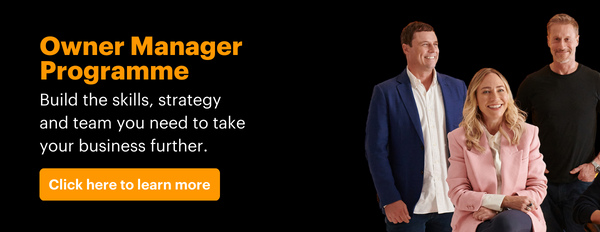We are asking Kiwi start-up entrepreneurs to give us a behind the scenes look at what it is like to start a business. This month: Lance & Ivy Jimmieson share how they failed with confidence - and what fast failure can be a good thing.
The idea had been floating around for ages, surfacing whenever we found five minutes to ourselves, between running after two young children and the pressures of an existing small business still quite reliant on its present owner. i.e. me.
Many of you entrepreneurs will be familiar with the process of pondering the what-if questions, often over a glass of red, of that idea that just won’t go away.
It got the better of us one night and I agreed to my wife’s insistence (without duress I might add) that we give it a go. That was it, the ‘Family Affair’ restaurant was ceremoniously launched… but there was a catch…
If I had learnt anything from running my own small consultancy practice of 10 staff and undertaking the Icehouse’s ‘Owner Manager Programme’ (No.23), it was an understanding that planning could avoid a lot of unnecessary expense, heartache and lost time. And as I look in the mirror and see a much older version of the person I really am, I can tell you it’s the lost time that is the most difficult to recover, so use it wisely.
To that end, the decision was made to run the idea through the Icehouse ‘Hatchery’ programme. We never doubted for a moment that the idea had merit – a belief backed up by our closest friends & self proclaimed business analysts. Our aim was simply to run the concept through a formal planning process, build a suitable launch pad, obtain the necessary sponsors and conquer the world with the coolest franchised restaurant idea since McDonalds. How simple is that?!
We enrolled, we attended and we struck up a great relationship with our EIR (Executive in Residence) at the Icehouse. I was again (following OMP23) very impressed with the calibre of people associated with the Icehouse.
We followed the ‘Hatchery’ programme, moving from the Leadership Process, the Marketing Segment through to Commercial Modelling.
We were led, challenged and given time to reflect on the deeper personal costs that would inevitably come home to roost – invited or not.
Some of the questions were easy, but more were tough. Some were obscure and needed time to untangle. Yet others required a joint and at times compromised answer.
The mere fact of committing to a programme like this is incentive enough to answer the tough questions honestly. Try a glib answer or stray from the brutal realities and expect your EIR to stop you in your tracks. They’re scarily dependable in that respect – uncompromising you might say… in the nicest possible way…
So where did it lead us?
As with anyone who undertakes this programme with commitment, we now have a new reality. We have an innate understanding of the ‘Not willing to compromise’ areas of our lives, revolving around the wellbeing of our kids and existing business – in that order.
The scale of the project grew to the point where the time and money commitment was beyond our ability to deliver, hence the risk of failure was significant. In the end, the decision to park the idea was simple and philosophically without charge.
Our advice to those of you with bright ideas and the burning Kiwi desire to run your own show (or conduct your own circus as the case may be) is to front up and put it to the test.
The Hatchery process is a great launch pad, with the subsequent stages of Market Validation and Incubation providing invaluable tools for those tough early years. I know, because I did it the hard way with my current business.
Be open, be brave and be prepared to fail early with confidence.
The learning’s from this process are readily transferable and are now benefiting our existing business. As a true entrepreneur – there are no downsides.
Submitted by Lance & Ivy Jimmieson




